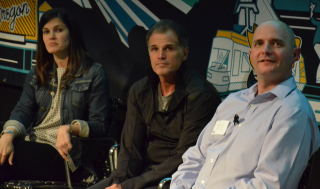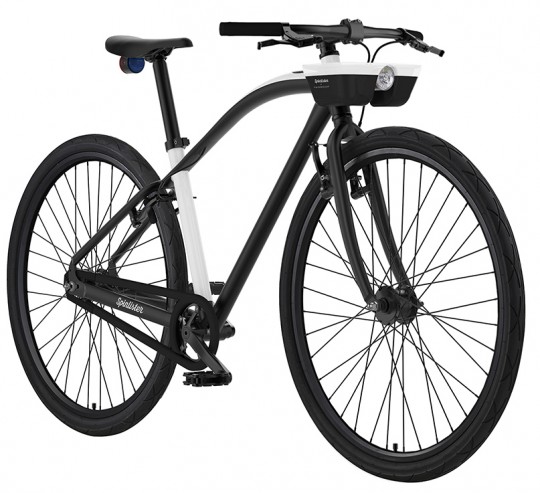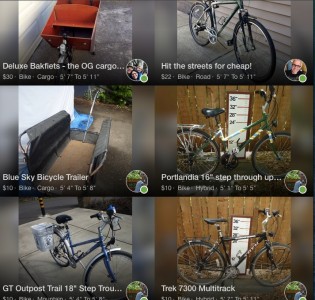
“sharing economy” executives at OMSI Thursday for
a Tech Fest Northwest panel.
(Photo: M.Andersen/BikePortland)
The user-owned bike share system due to launch in Portland in September says that participants won’t have to pump the tires in any bikes shared on their network.
That was one of several tidbits shared Thursday by the CEO of Spinlister, the Santa Monica-based peer-to-peer platform that is planning a first-of-its-kind bike sharing pilot program in Portland.
As BikePortland reported in March, Spinlister says it will buy a line of custom “Smart Bikes,” give them to selected Portlanders for free, and let them float freely around the Portland area like so many car2gos.
Anyone with a smartphone will be able to rent these bicycles, Spinlister says, and any revenue will be split 50/50 between Spinlister and the Smart Bike’s owner until Spinlister has paid off the bike’s initial cost.
After that, Spinlister has said it will pocket only 17.5 percent of the rental revenue — but Spinlister CEO Marcelo Loureiro suggested Thursday that this will be enough for the company to hire local contractors to provide basic maintenance for any bikes in its system.

Loureiro’s remarks came at the end of a panel about the sharing economy at Portland’s annual Tech Fest Northwest conference.
Speaking before a crowd of maybe 150, Loureiro was candid about the fact that the concept might or might not work.
“If it’s going to be good or not, I have no idea,” Loureiro said. “We have a great belief in the idea.”
The Brazil-born entrepreneur said the company he took charge of in 2013 is “here in Portland because this is where we have the best-engaged community.”
When someone requests a bike using Spinlister’s current rent-a-bike-out-of-somebodys’s garage service, Loureiro said, Portlanders actually tend to respond.
Advertisement
Choosing its listers carefully is key to Spinlister’s business model. “The shady listers, they don’t respond to emails,” he said.
Loureiro also said that instead of buying an insurance policy to back its novel business model, it is self-insured. Spinlister promises to fulfill any bike damaged, lost or stolen during one of its rentals for up to $10,000 in value, he said.
“Everyone worries about the risk,” Loureiro said. “We are taking the risk.”
Another detail: Spinlister’s Smart Bike owners will be in charge of “rebalancing” their own bikes, as the phrase goes in the bike share business. They’ll get mobile alerts to warn them if a bike has been dropped in an odd location and isn’t being used.
“If you want your bike to keep making money, it’s up to you,” Loureiro said.
Finally, in response to a question from Malia Spencer of the Portland Business Journal, Loureiro explained his company’s plan for addressing another seeming challenge for the Smart Bike system: theft.
Spinlister bikes, Loureiro said, will have electronic tracking devices in their tubes, presumably able to share their location via wireless signals to passing smartphones.
“The bike’s going to be stolen for sure,” he said. “But we’re going to get the bikes back. After a certain number of times, you will stop stealing these bikes.”
Spinlister’s plan is daring. And if it works, it could indeed be transformative. It’s also gaining momentum and positive headlines at a time when the City of Portland’s own bike share effort continues to lag. It will be interesting to see if this “smart bike” approach is able to get up and running before PBOT’s system.
If you’d like to take part in Spinlister’s bike share program, you can sign up here.


